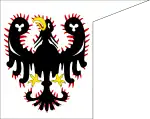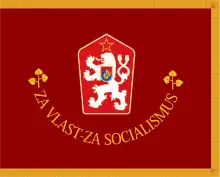 | |
| Státní vlajka České republiky | |
| Use | Civil and state flag, national ensign |
|---|---|
| Proportion | 2:3 |
| Adopted | 30 March 1920 (Czechoslovakia and later the Czech Republic) |
| Design | Two equal horizontal bands of white (top) and red with a blue isosceles triangle based on the hoist side. |
| Designed by | Jaroslav Kursa |
 | |
| Use | Unit colour |
| Proportion | 1:1 |
| Adopted | 1993 |
The flag of the Czech Republic (Czech: státní vlajka České republiky) is the same as the flag of the former Czechoslovakia. Upon the dissolution of Czechoslovakia in December 1992, the Czech Republic kept the Czechoslovak flag while Slovakia adopted its own flag. The first flag of Czechoslovakia was based on the flag of Bohemia and was white over red. This was almost identical to the flag of Poland (only the proportion was different), so a blue triangle was added at the hoist in 1920. The flag was banned by the Nazis in 1939 as they established a government nominally in control of Bohemia and Moravia, and a horizontal tricolour of white, red, and blue was used for the duration of the war. The 1920–1939 flag was restored in 1945.
History
The traditional colours of the Czech lands originated from an 1192 coat of arms (depicting a rampant lion with a double silver tail on a field of red).
After the establishment of an independent Czechoslovakia in 1918, the country had been using the red and white flag of Bohemia, identical to the Polish flag. Following calls for a new flag to be adopted by the fledgling state, a committee picked a design by Jaroslav Kursa, an archivist in the Czechoslovak Ministry of the Interior.[1] His design included the red and white horizontal stripes derived from the coat of arms of Bohemia and added a blue chevron extended halfway.
The flag was officially approved by the National Assembly of Czechoslovakia on 30 March 1920 and since then, it has been in continuous use, with the exception of the German occupation of Czechoslovakia during the Second World War.[2] Additionally, during a short period following the Velvet Revolution, between 1990 and 1992, the Czech part of the Czechoslovak federated state adopted the previous red and white flag.[3]
During the 1992 negotiations on the split of Czechoslovakia, a clause forbidding the use of the state symbols of Czechoslovakia by either successor state was inserted into the legislation concerning the dissolution of the federation.[4][5] However, the Czech Republic kept the use of the flag.[6][7]

Medieval Banner of the Duchy of Bohemia under the Přemyslid dynasty
.svg.png.webp)
Medieval Royal Banner of arms of the Kingdom of Bohemia

Kingdom of Bohemia
until 1918
First Czechoslovak Republic
1918–1920
First and Second
Czechoslovak Republic
1920–1939
Czechoslovakia
1945–1992
Protectorate of
Bohemia and Moravia
1939–1945
Czech Republic within Czechoslovakia (1990–1992)

Czech Republic
since 1993
Czechoslovakia
 Flag of Czechoslovakia.
Flag of Czechoslovakia.
(1920–1992)
.svg.png.webp) Naval Ensign of Czechoslovakia.
Naval Ensign of Czechoslovakia.
(1930–1955)

.svg.png.webp) Naval Ensign of Czechoslovakia.
Naval Ensign of Czechoslovakia.
(1955–1960)

 War flag of Czechoslovakia.
War flag of Czechoslovakia.
(1960–1990)

Dimensions

.svg.png.webp)
The blazon of this flag is per pall fesswise Argent, Azure, and Gules. The flag is formed from an isosceles triangle that extends halfway along the rectangle (a common mistake is to draw it shorter) and two bands: one white and one red. The most similar foreign flag is the flag of the Philippines but the latter has dimensions 1:2, the three colours permuted, and additional golden-yellow symbols added on it.
Flag colours
Colours scheme |
White | Red | Royal Blue |
|---|---|---|---|
| CMYK | 0-0-0-0 | 0-90-87-15 | 86-45-0-50 |
| HEX | #FFFFFF | #D7141A | #11457E |
| RGB | 255-255-255 | 215-20-26 | 17-69-126 |
| Closest Pantone | 2035 C[8] | 2154 C[9] |
Presidential standard
 | |
| Use | Presidential standard |
|---|---|
| Proportion | 1:1 |
| Adopted | 1993 (1918) |
| Design | Coat of arms with national motto "Pravda vítězí" (Truth prevails) and leaves of linden tree. |
| Designed by | Jiří Louda[10] |
Another Czech official symbol is the standard of the president of the Czech Republic. It was first introduced in 1918 for the president of Czechoslovakia. The current version, which was designed by heraldist Jiří Louda,[10] was adopted upon the creation of an independent Czech Republic in 1993.
Previous versions
.svg.png.webp)
 Presidential standard of First Czechoslovak Republic (1918–1939), and Czechoslovak Republic (1945–1960)
Presidential standard of First Czechoslovak Republic (1918–1939), and Czechoslovak Republic (1945–1960).svg.png.webp)
 Presidential standard of Protectorate of Bohemia and Moravia (1939–1945)
Presidential standard of Protectorate of Bohemia and Moravia (1939–1945).svg.png.webp)
 Presidential standard of Czechoslovak Socialist Republic (1960–1990)
Presidential standard of Czechoslovak Socialist Republic (1960–1990).svg.png.webp)
 Presidential standard of Czech and Slovak Federative Republic (1990–1992)
Presidential standard of Czech and Slovak Federative Republic (1990–1992)
See also
Literature
- Zbyšek Svoboda, Pavel Fojtík: brochure Naše vlajka. Vznik a vývoj české vlajky (Our Flag. Origin and evolution of the Czech flag), Libea, 2005, ISBN 80-239-5862-3.
- Petr Exner, Pavel Fojtík, Zbyšek Svoboda: brochure Vlajky, prapory a jejich používání (Flags, banners and their use), Libea, 2004, ISBN 80-239-2873-2.
References
- ↑ "Czech society of vexicologists on the origin of the Czechoslovak state flag" (MS Word) (in Czech). Retrieved 10 December 2007.
- ↑ Government of the Czech Republic The Czech Republic's national flag. Retrieved 4 March 2011.
- ↑ Law defining state symbols of the Czech Republic 67/1990 Sb, from 13 March 1990
- ↑ Ústavný zákon č. 542/1992 Zb. o zániku Českej a Slovenskej Federatívnej Republiky, Čl. 3 ods. 2
(Constitutional act. No. 542/1992 Col. on the dissolution of the Czech and Slovak Federative Republic, art. 3 sect. 2) - ↑ Zeman, Jiří (2011). "K některým otázkám používání české státní vlajky a vlajky Evropské unie". Časopis pro právní vědu a praxi (in Czech). 19 (2): 163–169. ISSN 1805-2789 – via Journals.Muni.Cz.
- ↑ Law defining state symbols of the Czech Republic 3/1993 Sb, from 17 December 1992
- ↑ Whitney Smith, "Flag of the Czech Republic", Encyclopedia Britannica.
- ↑ "#D7141A color name is Lava". www.color-name.com. Retrieved 22 February 2023.
- ↑ "#11457E color name is Dark Cerulean". www.color-name.com. Retrieved 22 February 2023.
- 1 2 "Zomrel heraldik Jiří Louda, autor českého štátneho znaku a prezidentskej zástavy". Aktuality.sk. 2 September 2015. Archived from the original on 29 September 2015. Retrieved 28 September 2015.
External links
- History of the Czech and Czechoslovak flag (in Czech)
- Czech Republic at Flags of the World
- Czech flag - facts, history, colors (in Czech)
- "Flag expert: Czechs only bring out their flag in emotional times" by Daniela Lazarová

